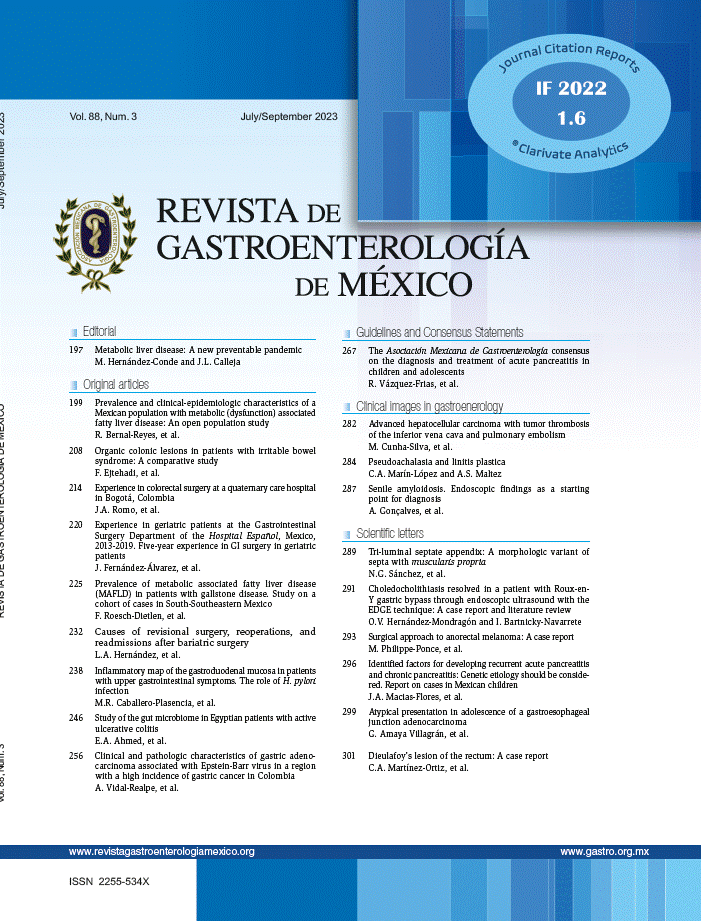We appreciate the interest shown by Fidanza-Hernandez et al. in our original article, Factors associated with hospital length of stay in children with acute pancreatitis,1 in which we refer to acute pancreatitis (AP) as the most common cause of pancreatic disease in children, as well as the fact that incidence worldwide has increased in recent years.
The aim of our article was to identify the factors associated with the length of hospital stay in patients hospitalized due to AP. With respect to the methodology employed, children under 18 years of age diagnosed with AP according to the INSPPIRE (INternational Study Group of Pediatric Pancreatitis: In Search for a CuRE) criteria were retrospectively selected and demographic, clinical, biochemical, nutritional, and treatment information was collected. To the best of our knowledge, ours is the first Mexican study to categorize pancreatitis, according to the classification of complications (local or systemic), and its grade (mild, moderately severe, and severe), according to the European Society for Pediatric Gastroenterology, Hepatology and Nutrition and the North American Society for Pediatric Gastroenterology, Hepatology and Nutrition.
We emphasized that the cause of AP is related to a wide spectrum of etiologies and has regional changes that depend on the type of population treated at each hospital. In our study, we determined that the main causes were anatomic/obstructive etiology (58.8%, [n=30/51, anatomic 12, obstructive 18]), idiopathic (17.6%, n=9/51), and traumatic (9.5%, n=5/51).
Regarding the observation that there could be etiologic differences between Latin America and Asia, we collected our study variables by intentionally searching for hypertriglyceridemia, chronic kidney failure, and hypercalcemia, grouping them into metabolic etiology, and for medications, smoking, and alcoholism, grouping them into toxic etiology. We identified toxic etiology in 9.8% (n=5/51) and the combination of metabolic/toxic etiology in 3.9% (n=2/51). With respect to systemic causes, we searched for comorbidities that included dyslipidemia, DM1, obesity, psychiatric disorders, inflammatory bowel disease, hepatitis, chronic kidney disease, DiGeorge syndrome, sickle cell disease, parathyroid hyperplasia, cystic fibrosis, and celiac disease. We documented obesity as an isolated event in 2 cases, recurring obesity in 4 patients, dyslipidemia in one case, and the combination of obesity, gallstones, and dyslipidemia in one patient. However, as we stated in our article, the fact that ours was a retrospective study that excluded cases that developed AP during hospitalization for other diagnoses, we could have ruled out patients with said etiologies. Thus, we agree that this reflects the need for more prospective studies to be carried out.
A meta-analysis that included 8873 pediatric patients from 48 studies conducted in different countries (the United States, Italy, Israel, China, Turkey, Colombia, Poland, Saudi Arabia, Japan, Australia, the United Kingdom, India, Serbia, Portugal, South Korea, France, Spain, Switzerland, and Canada) found that the 3 main causes by region were: gallstones (33%), systemic disease (31%), and infection (29%) in Asia; trauma (32%), idiopathic disease (25%), systemic disease (16%), and infection (16%) in Oceania; idiopathic disease (26%), systemic disease (13%), and infection (13%) in Europe; idiopathic disease (25%), systemic disease (16%), alcohol (16%), medications (16%), genetics (16%), gallstones (16%), and infection (16%) in North America; and idiopathic disease (29%), medications (19%), and anatomic alterations (15%) in South America.2
Given the above information, we agree there are different etiologic factors, and even though Latin America is not widely represented in the international literature, there is an ever-increasing interest in pediatric pancreatology in the region.
The Asociación Mexicana de Gastroenterología recently published its consensus on the diagnosis and treatment of acute pancreatitis in children and adolescents, in which a group of experts reiterate the fact that multiple factors intervene in the etiology of AP and that it varies according to age group.3
Lastly, adopting a proactive position is urgently needed, with respect to the diagnosis of AP, the understanding of the different etiologies, and its treatment. The available evidence in the literature should be taken into account, to prevent comorbidities, complications, recurrences, and prolonged hospitalizations, as mentioned above.
Ethical considerationsThe authors declare that this letter contains no personal information that could identify the patients.
Financial disclosureNo financial support was received in relation to this letter.
Conflict de interestThe authors declare that there is no conflict of interest.



